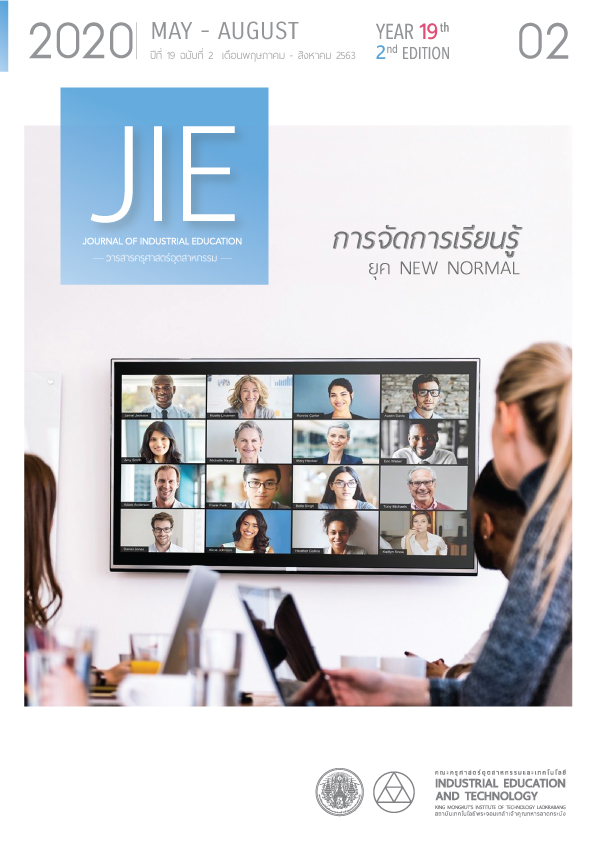A STUDY OF MATTHAYOMSUKSA II STUDENTS' PROOF ABILITIES IN PARALLEL-LINES TOPICS VIA THE CONSTRUCTIVIST LEARNING MODEL (CLM)
Keywords:
proof abilities, The Constructivist Learning Model (CLM), parallel-linesAbstract
The purpose of this study was to study students' proof abilities in parallel-lines topics after teaching by using The Constructivist Learning Model (CLM). The target group was 40 Matthayomsuksa II students chosen by the cluster sampling process from the second semester of academic year 2019 of Sri Ayudhya School under the Royal Patronage of H.R.H. Princess Bejraratanarajsuda, Bangkok. Each classroom was arranged by combining students' abilities levels, which were good, medium, and weak grades. The experimental instruments were 10 lesson plans in parallel-lines topics, and tests of proof abilities in parallel-lines topics. The duration of the study took 10 periods, 50 minutes each for teaching. After being taught by using The Constructivist Learning Model (CLM), the researcher took 1 period to test the proof abilities in parallel-lines topics of students. The data obtained was analyzed by using basic statistics, and Z-test for population proportion.
The research revealed that students' proof abilities in parallel-lines topics after teaching by using The Constructivist Learning Model (CLM) passed the criteria of 60 percent of all students with statistical significance at the level of .05.
References
Ngamphrom Onbuakhao & La Phawaphutanon. 2014. A Study of Mathematics Conceptual Change on Parallel using Remedials Teaching for Mathayomsuksa 2. Journal of Education Khon Kaen University, 8(3), pp. 226-235.
Tavee Waiyamitra. 2012. The development of computer assisted instruction lesson on parallel line for mathayomsuksa 2 students. Journal of Graduate Studies in Rajabhat Nakhonsawan University, 7(19), pp. 69-84.
Yaowaret Singhanan. 1990. A comparison of ability to construct proof in geometry between mathayom suksa three students in government and private schools, educational region six. Master of Education (Teaching Mathematics), Chulalongkorn University.
Aumporn Makanong. 2015. Mathematics for Secondary School Teachers. 2nd ed. Bangkok: Faculty of Education Chulalongkorn University.
Senk, S. L. 1985. How well do students write geometry proofs? The mathematics teacher, 78(6), pp. 448-456.
Thanathan Fimưsan. 2016. Effects of Four-Step Constructivist-Based Teaching Strategy on Physics Concepts and Attitudes Toward Physics Learning of Eleventh Grade Students. Master of Education (Science Education), Chulalongkorn University.
Thitsana Khammanee. 2018. Science of Teaching Pedagogy. 22st ed. Bangkok: Chulalongkorn University Press.
Yager, R. E. 1991. The constructivist learning model. The science teacher, 58(6), pp. 52-57.
Kannika Hanphitak. 2016. The Effects of Learning Management Based on Constructivist Theory of Mathematical Concepts and Problem-solving Ability on the Topic of Triangles of Grade 5 Students. Master of Education (Teaching Mathematics), Burapha University.
Craven, J. D. 2010. Bridging Algebra & Geometry with. Mathematics Teacher, 103(9), pp. 676-681.
Savery, J. R., & Duffy, T. M. 1995. Problem based learning: An instructional model and its constructivist framework. Educational technology, 35(5), 31-38.
Chiraphan Khongkhaoroptham. 2000. The Development of Mathematics Learning on Partial Fraction for Students in Diploma of Vocational Education Program Based on the Constructivism Teaching Theory. Master of Science, Ubon Ratchathani Rajabhat University.
Dewi, I., & Harahap, M. S. 2016. The Development of Geometri Teaching Materials Based on Constructivism to Improve the Students' Mathematic Reasoning Ability through Cooperative Learing Jigsaw at the Class VIII of SMP Negeri 3 Padangsidimpuan. Journal of Education and Practice, 7(29), pp. 68-82.
Chananan Singmui & Wirayut Ninsakhu. 2016. A Study of Resoning Abilities in Probabilities topics via a constructivist learning. Proceedings of the 22nd Annual Meeting in Mathematics (AMM 2017), Chiang Mai, 2- 4 June 2017. pp. 1-13.
Borisudtum Pimsiri. 2018. The Development of Learning Model Based on Constructivismto Enhance Mathematical Abilities for Students in Primary. Journal of Silpakorn University, 11(1), p. 616-632.
Maya, R., & Sumarmo, U. 2011. Mathematical understanding and proving abilities: experiment with undergraduate student by using modified Moore learning approach. Journal on Mathematics Education, 2(2), pp. 231-250.
Natdapha Nimitdi & Natchira Butdi. 2017. Learning Management According to The Guideline to Advanced Achievement to Promote Geometric Thinking of Mathayomsuksa Three Students. Proceedings of the 22nd Annual Meeting in Mathematics (AMM 2017), Chiang Mai, 2- 4 June 2017. pp. 1-14.
Chaiwat Sutthirat. 2019. 80 Innovative Learning Management That is Student-Centered. 8th ed. Bangkok: Chulalongkorn University Press.
Mariotti, M. A. 2006. Proof and proving in mathematics education. In Handbook of research on the psychology of mathematics education. Brill Sense.
Prawit Karin, Chanitwara Lœtamo̜nphong & Songchai Aksornkhit. 2018. The Effects of Learning Management based on Constructivist Theory together with The Geometer’s Sketchpad (GSP) on Mathematical Reasoning Ability on Circle of Mathayomsuksa Three Students. Journal of Graduate School Chandrakasem Rajabhat University, 13(2), pp. 1-12.
Downloads
Published
How to Cite
Issue
Section
License
"The opinions and contents including the words in papers are responsibility by the authors."
"ข้อคิดเห็น เนื้อหา รวมทั้งการใช้ภาษาในบทความถือเป็นความรับผิดชอบของผู้เขียน"



